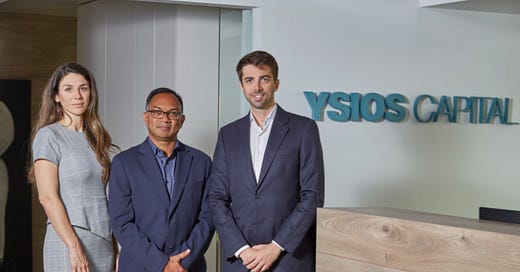Exclusive: Successful Biotech CEO Talks Scaling from Series A to $157M Series B
Engrail Therapeutics’s Vikram Sudarsan details its oversubscribed Series B raise and why life science investors are betting big on the future of neuroscience.
Business San Diego delivers in-depth profiles of founders and insights on the most successful companies, executives, and technologies in San Diego. Subscribe to make sure you don’t miss the next story.

In March, Engrail Therapeutics CEO had just got back from a week-long trip from Europe where he met with some of the company’s new and existing investors following the heels of the San Diego biotech startup’s biggest fundraise to date.
Vikram Sudarsan, the chief executive and co-founder, has been extremely busy scaling an early-stage life sciences firm which aims to develop therapies to treat diseases with “significant unmet medical needs” including anxiety, depression, and post-traumatic stress disorder (PTSD).
“I’m really proud of our operational efficiency,” Mr. Sudarsan told me on a Zoom call.
“If you look at our pipeline, all of our chemical compounds are near clinical stage or already in the clinic today. More impressively, we’ve built it with only a team of 20 people, which is a massive accomplishment.”
Sudarsan sees growing opportunity in the field of neuroscience. The repeat life sciences CEO shared that he was distraught a decade ago, when some of the biggest names in Big Pharma stepped away from neuroscience.
“Earlier in the decade, some of the biggest names in Big Pharma actually decided to scale back or completely step away from neuroscience,” he said. “Neuroscience is starting to make a big comeback.”
While neuroscience has always been tough, it has potential to meaningfully impact mental health and neurological diseases, he noted.
Last month, Engrail made headlines after announcing it had raised roughly $157 million from top life science venture capital firms such as Norwest Venture Partners, Forbion, and F-Prime Capital, among others.
Mr. Sudarsan spoke with Business San Diego about the startup’s latest fundraise, why investors are betting big on neuroscience, and what’s next for the promising biotech.

Q: Tell us the founding story of Engrail Therapeutics?
We started the company about four years ago, a few months before the pandemic.
We'd focused on mechanisms that were well-validated, but that could be vastly improved to create drugs that are more effective and safer. Engrail’s first drug for anxiety builds upon well-known GABA pharmacology.
In particular, it does this in a very specific precise way, targeting specific receptors that should yield a better “anxiolytic profile” than current available treatment options.
Our depression drug focuses on a mechanism that will increase dopamine directly in the brain, helping treat patients with a specific type of depression called Anhedonia.
We took steps to essentially be more precise in targeting specific mechanisms and thereby patients, but also in de-risking the chemistry. That risk profile ended up resonating with investors who came in pretty big behind our small biotech company.

Q: Can you walk us through closing $157M Series B Round
When we initially spoke, we did a $32 million Series A raise.
We then closed another $32 million with the same investors bringing us at a total of $64 million in venture funding.
That allowed us to a pretty advanced stage, with a decent pipeline, which then led us to do our first real financing outside of our previous investor base.
We went out looking to raise $100 million and ended up raising $157 million, which is a testament to the quality of the science that our team has put together.
For the first time, we diversified our shareholder base which was a big deal for us, especially in an environment that's been horrendous for biotech in the last year.

Q: Thoughts on the recent biotech activity in San Diego?
I'm excited by the activity in San Diego, it's phenomenal to see what's going on.
We've gone from a small town — which back then you build a small biotech startup to get sold — however that's simply not the case anymore.
We have multiple commercial stage neuroscience companies including Acadia Pharmaceuticals, Neurocrine Biosciences and others which is really exciting to see.
This is the right kind of transformation for San Diego, it’s brilliant.
San Diego should not be seen only as a birthplace for innovation but as a place where companies nurture these molecules through development and commercialization.
Q: What’s next for the company in terms of growth?
We’ve built the company with a combination of highly experienced senior leadership, but also rising stars in the industry — that balance has worked extremely well.
The main focus for hiring in our clinical team as well as other functions, but we will continue to grow but in a very deliberate manner.
The investor group that we have joining us is something that we're proud of and will set us up for long-term success.
We’ve got a group around the table that have a real “company building” mentality.





